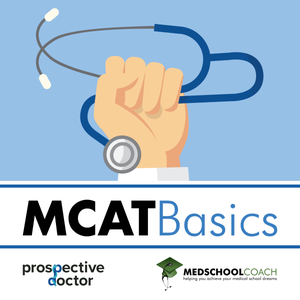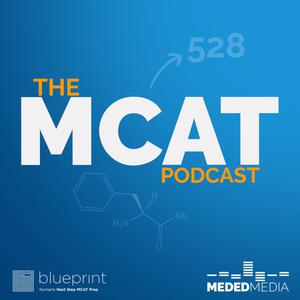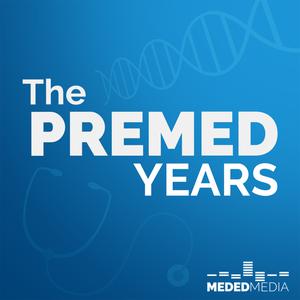
MCAT Basics (from MedSchoolCoach)
MedSchoolCoach
- 51 minutes 24 secondsDNA Replication and Central Dogma
DNA replication and the central dogma are fundamental concepts in molecular biology, and breaking down the different replication methods and the processes of transcription and translation is crucial for understanding how genetic information is expressed and passed on in cells.
In the first part of our episode, we'll break down DNA replication, exploring the concepts of conservative, semi-conservative, and dispersive replication, unraveling the mechanisms that drive this fundamental process.
Later, we'll focus on transcription and translation, delving into the nuances between prokaryotic and eukaryotic organisms. We'll uncover the mechanisms by which genetic information is transcribed from DNA to RNA and then translated into proteins, all while considering the diverse cellular locations where these processes take place.
Visit MedSchoolCoach.com for more help with the MCAT.
Jump into the conversation:
[01:07] Episode Overview
[01:54] DNA replication explanation
[05:53] Three phases of replication - initiation, elongation, and termination
[25:12] Central Dogma description
[25:50] Transcription Process
[36:31] The differences between eukaryotic and prokaryotic transcription
[37:58] Translation Process
16 January 2025, 8:00 am - 41 minutes 25 secondsThermodynamics
Thermodynamics is fundamental to mastering chemistry concepts and understanding the energy dynamics within biological systems crucial for the MCAT.
In this episode, host Sam Smith dives into the laws of thermodynamics, covering everything from the zeroth law to the third. You'll explore key concepts like enthalpy, entropy, and Gibbs Free Energy and learn how they apply to reaction spontaneity and equilibrium. Sam also gives practical examples, including how the equilibrium constant and reaction quotient (Q vs. K) affect reactions, and covers types of heat transfer—conduction, convection, and radiation—essential for the Chem/Phys section. Visit MedSchoolCoach.com for more help with the MCAT.
Jump into the conversation:
(00:00) Intro
(01:03) Introduction to thermodynamics
(03:58) The four laws of thermodynamics
(12:46) Thermodynamic variables: entropy, enthalpy, and Gibbs Free Energy
(24:11) Phase changes in thermodynamics
(25:30) Gibbs Free Energy and spontaneity of reactions
(38:01) The three types of heat transfer: conduction, convection, and radiation
7 January 2025, 9:00 am - 50 minutes 28 secondsCell and Tissue Types
Cells and tissues form the building blocks of life, which are crucial for mastering key concepts in the MCAT’s biology and biochemistry sections.
In this episode, host Sam Smith breaks down the differences between prokaryotic and eukaryotic cells, exploring animal, plant, and bacterial cell structures alongside unique cell types like erythrocytes. You’ll gain insights into the various tissue types—epithelial, muscle, connective, and nervous—along with their roles in the body. Plus, Sam highlights essential details on ribosome size, cell reproduction methods, and structural elements like vacuoles and cell walls. This episode equips you with strategies to distinguish cell and tissue types confidently, setting you up for success on exam day.
Visit MedSchoolCoach.com for more help with the MCAT.
Jump into the conversation:
(00:00) Intro
(01:03) Cell types overview
(02:44) Prokaryotic vs. eukaryotic cells
(09:53) Animal, plant, and Ffungi cells
(16:20) Bacteria and archaea characteristics
(19:09) Erythrocytes: Structure and function
(20:15) Tissue types intro
(23:35) Epithelial tissue types and functions
(33:17) Connective and nervous tissues
2 January 2025, 9:00 am - 53 minutes 37 secondsRenal Physiology
Understanding the kidneys' role in the body’s balance is essential for the MCAT and beyond.
In this episode, host Sam Smith discusses renal physiology, covering everything from kidney anatomy to the nephron’s critical functions in filtration, reabsorption, secretion, and excretion. You’ll explore the roles of the renal cortex and medulla, learn about the loop of Henle, and uncover the importance of ions, plasma volume, and pH regulation in kidney function. Plus, we’ll examine hormones like ADH and aldosterone and their impact on fluid balance, as well as essential measurements like glomerular filtration rate (GFR) for assessing kidney health.
Visit MedSchoolCoach.com for more help with the MCAT.
Jump into the conversation:
(00:00) Intro to renal physiology
(02:43) Kidney anatomy overview
(08:38) Nephron structure and function
(09:50) Six key functions of the kidney
(12:03) Nephron Processes: Filtration
(17:32) Nephron Processes: Reabsorption and secretion
(22:51) The Loop of Henle
(26:05) Understanding osmolarity in the Loop of Henle
(26:55) Ion transport in the ascending limb
(32:04) The role of the collecting duct
(37:18) Hormonal regulation of the nephron
(46:50) Key measurements of renal function
(50:15) MCAT Advice of the Day
31 December 2024, 9:00 am - 40 minutes 59 secondsPsychosocial Development and Identity
The essentials of identity theories and psychosocial development reveal the foundational elements of human behavior and self-perception.
In this episode, Sam Smith discusses the core theories around identity, from Erikson’s stages of psychosocial development and Freud’s psychosexual stages to Piaget’s cognitive framework and Kohlberg’s stages of moral growth. Sam talks about how each theory is represented in MCAT questions, explaining key differences and how they impact our understanding of self-concept, self-esteem, and social roles. Whether it's Cooley’s looking-glass self or Vygotsky’s zone of proximal development, this episode helps make sense of the MCAT’s approach to personality and identity development.
Visit medschoolcoach.com for more help with the MCAT.
Jump into the conversation:
(00:00) Intro
(01:04) Psychosocial development and identity
(01:42) The different theories of identity formation
(01:57) Basic ideas regarding identity and self-concept
(08:29) Erikson's psychosocial development theory
(16:47) Testing strategies and MCAT questions
(17:57) Freud's psychosexual development theory
(24:01) Piaget's stages of cognitive development
(28:15) Kohlberg's theory of moral development
(32:42) Cooley's looking-glass self
(33:21) George Herbert Mead's the I and the Me
(34:34) Vygotsky's social development theory
26 December 2024, 9:00 am - 44 minutes 26 secondsFunctional Groups: Physical and Chemical Properties
A deep understanding of functional groups is crucial for excelling in the MCAT, as they play a key role in the reactivity, physical properties, and biological functions of molecules. In this episode, Sam Smith breaks down the essential functional groups, covering their physical and chemical properties, biological relevance, and common reaction mechanisms. From alcohols and carbonyl-containing groups like aldehydes and ketones, to nitrogen-containing amines and amides, Sam explains how these groups are presented in exam questions and their impact on biological systems.
Visit medschoolcoach.com for more help with the MCAT.
Jump into the conversation:
(00:00) Intro
(01:54) How the MCAT asks questions about functional groups
(02:01) Physical vs. chemical properties
(04:09) Alcohols: Structure and classification
(06:13) MCAT questions related to the physical properties of alcohols
(10:03) MCAT question examples related to boiling points
(11:54) Biological reactions involving alcohols
(34:23) Reactivity of carbonyl-containing functional groups
24 December 2024, 9:00 am - 47 minutes 18 secondsElectromagnetism
Electromagnetism is a critical component of physics, playing a pivotal role in everything from circuits to medical imaging technologies like MRIs. It is also a crucial topic for the MCAT, appearing frequently in the physics and chemistry sections.
In this episode, Sam Smith breaks down the fundamental concepts of electricity and magnetism. Sam walks through the basics of static electricity, charge conservation, and Coulomb’s Law and explains how moving charges create currents and the forces exerted by electric and magnetic fields. Visit medschoolcoach.com for more help with the MCAT.
Jump into the conversation: (00:00) Intro (01:44) How charge is defined: positive and negative (03:31) History of charge and the amber effect (05:02) Static electricity and the conservation of charge (07:26) Conductors vs. insulators (09:22) How electrostatic force is governed by Coulomb’s Law (10:52) Understanding electric fields (16:27) The relationship between electric field strength and distance (18:17) How moving charges create a current and electric potential (22:23) Different types of magnetic materials and their behavior (25:45) How magnetic fields are visualized and understood through field lines (28:32) The right-hand rule explained (33:22) How magnetic forces act on moving charges and currents (40:01) The application of electromagnetism in MRIs (44:55) MCAT Advice of the Day
19 December 2024, 9:00 am - 51 minutes 9 secondsPsychology and Sociology Theories
Understanding social and psychological theories is crucial for success on the MCAT, as these concepts shape everything from human behavior to societal structures.
In this episode, Sam Smith breaks down the essential sociological and psychological theories you need to master, ranging from functionalism and conflict theory to the theories of emotion. Sam explains how these theories apply to real-world scenarios, including their relevance in medicine, healthcare disparities, and patient interactions.
Visit medschoolcoach.com for more help with the MCAT.
Jump into the conversation:
(00:00) Intro
(01:58) Overview of social and psychological theories
(03:23) Functionalism
(09:55) Conflict theory
(12:52) Symbolic interactions
(15:12) Social constructionism
(18:46) Rational choice and exchange theory
(23:54) Feminist theory
(26:10) Behaviorism
(29:34) Life course theory
(33:45) Theories of emotion
(41:03) Motivational theories
17 December 2024, 9:00 am - 35 minutes 25 secondsThe Reproductive System
In this episode of MCAT Basics, Sam Smith discusses the reproductive system and development, breaking down essential topics for the bio and biochem section of the MCAT. Sam walks through the key reproductive organs, the processes of spermatogenesis and oogenesis, and the pathway sperm and eggs take in human reproduction.
Visit medschoolcoach.com for more help with the MCAT.
Jump into the conversation:
(00:00) Intro
(01:30) Reproductive organs: Overview of male and female reproductive anatomy
(03:16) Spermatogenesis: The process of sperm cell development
(04:55) Meiosis in spermatogenesis: From diploid to haploid cells
(07:02) Spermatogenesis recap: The pathway from spermatagonia to spermatozoa
(09:45) The menstrual cycle: Overview of the four phases
(11:15) Ovulation: Triggered by luteinizing hormone surge
(11:55) The luteal phase: Role of the corpus luteum in progesterone production
(12:56) Menstruation: Progesterone drop and the sloughing of the uterine lining
(14:16) Oogenesis: The process of egg cell development
(18:17) Differences between spermatogenesis and oogenesis
(19:18) Trisomy 21 (Down Syndrome) and its relation to maternal age
(21:08) Fertilization: The process of sperm fusing with the egg
(28:51) Gastrulation and the formation of germ layers
(30:24) Germ layers: Mesoderm, ectoderm, and endoderm
12 December 2024, 9:00 am - 46 minutes 38 secondsAtomic Chemistry
Atomic chemistry is a core component of the MCAT, essential for understanding molecular behavior and periodic trends.
In this episode, host Sam Smith explores key concepts in atomic chemistry, including the intricacies of quantum theory, hybridization, and molecular geometry. You'll gain insights into electron configuration, periodic trends, and the role of quantum numbers in describing electrons. Sam also discusses the significance of nuclear decay, from alpha to beta and gamma decay, and how it impacts atomic structure.
Visit MedSchoolCoach.com for more help with the MCAT.
Jump into the conversation:
(00:00) Intro
(01:48) Understanding atomic orbitals and the planetary model
(04:54) Quantum theory and the wave-particle duality of electrons
(06:52) Types of atomic orbitals
(08:29) Electron configuration and its real-world applications
(12:24) Hund’s Rule and the Pauli Exclusion Principle
(17:45) The four quantum numbers
(22:10) Hybridization and bond formation
(26:14) Molecular geometry and its relevance
(29:44) Ionic vs. covalent bonds and electronegativity
(34:48) Periodic table trends: Atomic radius, electronegativity, and ionization energy
(37:49) Nuclear decay: Half-life and types of decay (alpha, beta, gamma)
(44:46) MCAT advice of the day
10 December 2024, 9:00 am - 47 minutes 3 secondsLight and Optics
A foundational part of the MCAT, light and optics bridge the gap between physics and biology, making them vital for your exam preparation. In this episode, Sam Smith breaks down the fundamentals of light, covering both its wave and particle properties. From the energy of photons and the photoelectric effect, to wave behavior and the principles of refraction and reflection, Sam simplifies complex concepts to help you grasp key equations and principles. You'll also learn about lenses, ray tracing, and the real-life applications of polarization. Visit medschoolcoach.com for more help with the MCAT.
Jump into the conversation:
(00:00) Intro
(01:03) Introduction to light and optics
(03:10) How photons carry energy
(05:34) The photoelectric effect and its significance
(17:47) Introduction to waves and simple harmonic motion
(18:46) Longitudinal vs. transverse waves explained
(21:47) Constructive and destructive interference in wave behavior
(23:40) Polarization, reflection, and refraction in light
(36:40) How lenses and ray tracing work
(44:59) MCAT Advice of the Day
5 December 2024, 9:00 am - More Episodes? Get the App
Your feedback is valuable to us. Should you encounter any bugs, glitches, lack of functionality or other problems, please email us on [email protected] or join Moon.FM Telegram Group where you can talk directly to the dev team who are happy to answer any queries.
 The MCAT Podcast
The MCAT Podcast
 Dr. Matt and Dr. Mike's Medical Podcast
Dr. Matt and Dr. Mike's Medical Podcast
 GroSeries: An MCAT Review Podcast
GroSeries: An MCAT Review Podcast
 Psychology Unplugged
Psychology Unplugged
 The Premed Years
The Premed Years